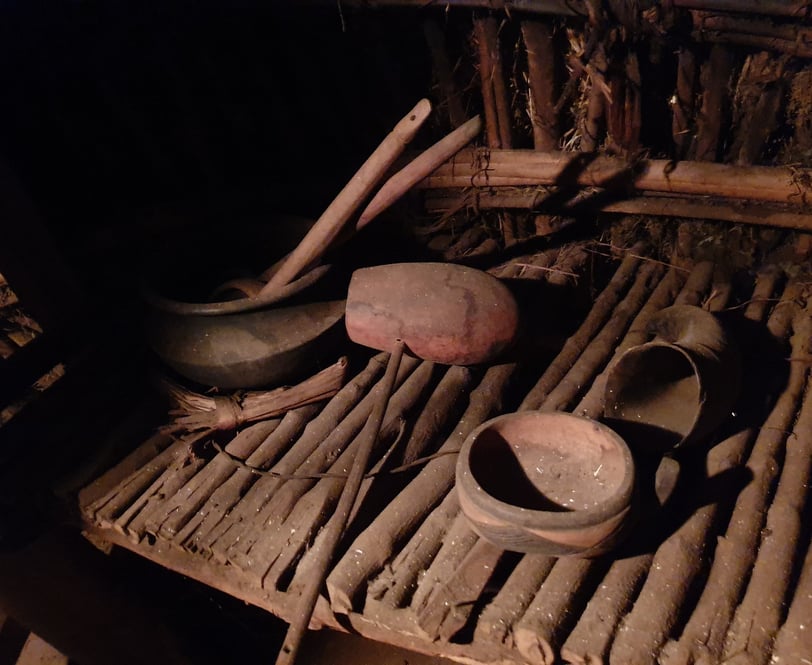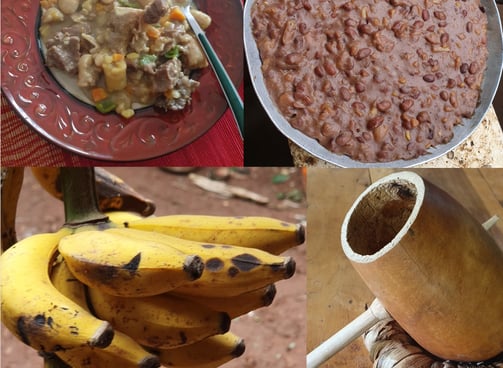True Tanzania Art and Culture Boutique, Your One Stop Shop To Tanzania
The Flavours of Tanzania: A Culinary Journey Through 120 Tribes
Join us for a hands-on culinary experience where you'll learn to cook authentic Tanzanian dishes rooted in tradition and the spirit of Ujamaa (togetherness). From mastering classics like pilau and ugali to creating flavorful coconut curries and spice blends, our classes teach you sustainable and clean cooking methods while celebrating the rich cultural heritage of Tanzania’s 120 tribes. Perfect for food lovers, team-building, and group activities, our cooking lessons offer more than just a meal — they foster connection, teamwork, and a sense of community. Karibuni sana – come cook, share, and celebrate with us!.
FOODCULINARY EXPERIENCE
Team True Tanzania
9/18/20244 min read


Discover the Flavours of Tanzania with True Tanzania’s Swahili Cooking Classes!
Tanzanian cuisine is a vibrant blend of indigenous traditions and influences from traders, explorers, and settlers who have passed through the region for centuries. This rich cultural exchange has made Tanzanian food a delicious fusion of African, Middle Eastern, Indian, and European flavours. Today, Tanzanian cuisine is a reflection of the country’s history, diverse landscape, and its 120 tribes, each with its own unique food traditions.
A Brief History of Tanzanian Cuisine
Tanzanian cuisine has its roots in indigenous communities that have lived in the region for thousands of years. These early Tanzanians relied on local, seasonal ingredients such as millet, sorghum, yams, bananas, and wild game. Traditional cooking methods like roasting, boiling, and steaming were used to prepare meals that were simple but nutritious. The staple food of most Tanzanian tribes remains ugali, a stiff porridge made from maize or cassava flour, served with a variety of side dishes like vegetables, beans, or meat.
However, as traders and explorers from the Middle East, India, and Europe began to frequent the Tanzanian coast, they brought with them new ingredients, spices, and techniques that transformed the local cuisine. The Swahili Coast, particularly Zanzibar, became a melting pot of culinary traditions, where African, Arab, Persian, and Indian influences blended into the rich flavours we associate with Tanzanian food today.
Tribal Dishes and National Staples
Despite the diverse food traditions of Tanzania's 120 tribes, some dishes are shared across the country and unite the nation. Ugali, mchicha (a local green similar to spinach), maharage (beans), and dagaa (small dried fish) are staples that can be found in most Tanzanian households. However, each tribe has its own unique dishes that reflect their history, geography, and way of life.
The Chagga people of Mount Kilimanjaro are known for their banana-based dishes, such as machalari (a banana and beef stew).
The Maasai of northern Tanzania primarily rely on nyama choma (grilled meat) and milk as they are semi-nomadic pastoralists.
The Sukuma tribe near Lake Victoria is famous for dishes using dagaa and tilapia, often cooked with tomatoes and onions.
Swahili Influence on Tanzanian Cuisine
One of the most prominent influences on Tanzanian cuisine comes from the Swahili people, who have lived along the coast for centuries. The Swahili cuisine is a perfect fusion of African, Arab, and Persian culinary traditions, as these regions engaged in extensive trade. Dishes like pilau and biryani showcase a blend of rice, coconut milk, and rich spices like cardamom, cinnamon, and cloves, which are used more generously in Tanzanian cooking than in other parts of East Africa.
Street foods like samosas, bhajias, and kachori—which have clear Indian and Middle Eastern origins—are now widely enjoyed across Tanzania. Coastal cuisine relies heavily on seafood and coconut-based dishes, with mchuzi wa nazi (coconut curry) being a prime example of how the region's flavors come together.
Ujamaa: The Spirit of Sharing
Central to Tanzanian culture is the philosophy of Ujamaa, a Swahili word meaning “familyhood” or “togetherness.” This principle was popularised by Tanzania's first president, Julius Nyerere, and reflects the spirit of community cooperation and sharing. Ujamaa plays a key role in Tanzania’s food culture, where sharing meals is seen as a symbol of unity and trust. In rural areas, if one family grows tomatoes and another grows onions, it’s common for them to exchange produce, ensuring that everyone benefits from the harvest.
Food is not just about eating in Tanzania; it’s about building relationships and supporting one another. This philosophy is also expressed in the tradition of bartering crops and sharing food with neighbours, friends, and even strangers who might pass by during mealtime.
True Tanzania’s Swahili Cooking Lessons: Sharing Ujamaa Through Food
At True Tanzania, we aim to share not only the flavours of Tanzanian cuisine but also the values behind it. Our Swahili cooking classes are designed to reflect the spirit of Ujamaa, bringing people together in a way that’s authentic, sustainable, and fun.
Through our cooking classes, you will:
Learn Authentic Tanzanian Recipes: Prepare traditional dishes like ugali, pilau, mchicha, and more using fresh, local ingredients and traditional methods.
Cook Sustainably: We focus on reducing waste and using every part of the ingredient, reflecting Tanzania’s traditional respect for nature and the land.
Embrace Clean, Healthy Cooking: Learn how to cook nutritious meals using fresh vegetables, natural oils, and spices. Our emphasis is on clean, wholesome food, much like what you would find in a Tanzanian home.
Foster Togetherness: Just as Tanzanians cook and eat together, our classes emphasise teamwork and connection. Whether you're cooking with family, friends, or coworkers, the experience fosters cooperation and communication.
At the end of each class, we’ll gather to share the food we’ve prepared—just like in a Tanzanian village. It’s not just about the food; it’s about the relationships we build along the way.
Join Us on a Journey Through Tanzanian Flavours
At True Tanzania, we believe that food is more than just a meal – it’s a way to connect with others, share our heritage, and celebrate the spirit of community. Our cooking classes offer a hands-on experience where you’ll learn the skills to cook authentically, sustainably, and with the spirit of Ujamaa.
So whether you’re a food enthusiast, a group looking for a fun bonding experience, or someone who wants to explore the rich culture of Tanzania, True Tanzania welcomes you to our Swahili cooking lessons. Let’s cook, share, and celebrate the flavours that make Tanzania truly special.
Karibuni sana! (You are all welcome!)


Get in touch
Address
True Tanzania Boutique is a unique and exclusive store located at;
Studio 6, 43 Ebury Bridge Road, London, SW1W8DX.
This boutique offers a wide range of authentic and high-quality Tanzanian products, making it the perfect place to find something special. From traditional clothing and accessories to handmade crafts and artwork,
True Tanzania Boutique showcases the rich culture and heritage of Tanzania. Whether you're looking for a one-of-a-kind gift or simply want to treat yourself, this boutique has something for everyone.
The knowledgeable and friendly staff are always on hand to assist and provide recommendations, ensuring a memorable and enjoyable shopping experience. Visit True Tanzania Boutique today and discover the beauty of Tanzania right in the heart of London.
Contacts
+44-7740-890522 I truetanzaniaexplore@gmail.com
© 2025 exploretruetanzania.com . All Rights Reserved.
